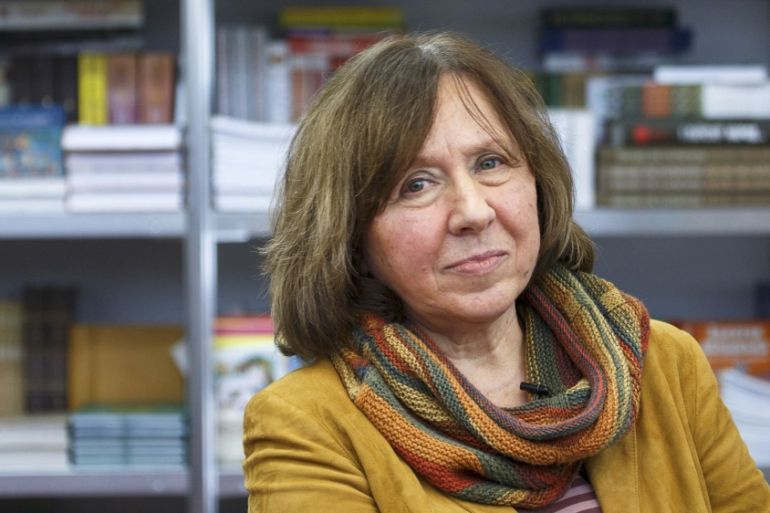Belarussian Alexievich awarded Nobel literature prize
Svetlana Alexievich wins award for work on Soviet women during Second World War and after Chernobyl disaster.

Belarussian author Svetlana Alexievich has been awarded the Nobel Prize for Literature for her portrayal of the harshness of life in the Soviet Union.
|
|
In her first public response on Thursday, the author denounced Russia’s intervention in Ukraine as an “invasion”.
Keep reading
list of 4 itemsInside the pressures facing Quebec’s billion-dollar maple syrup industry
‘Accepted in both [worlds]’: Indonesia’s Chinese Muslims prepare for Eid
Photos: Mexico, US, Canada mesmerised by rare total solar eclipse
The Swedish Academy said Alexievich’s work, which chronicles the lives of Soviet women during World War Two as well as the consequences of the 1986 nuclear disaster in Chernobyl and the Soviet military adventure in Afghanistan, was “a monument to suffering and courage in our time”.
Alexievich collected hundreds of interviews from people whose lives were affected by these tumultuous events, putting them together in works that were like a “musical composition”, the academy said in awarding the $972,000 prize.
“By means of her extraordinary method, a carefully composed collage of human voices, Alexievich deepens our comprehension of an entire era,” the academy said.
Criticism of Russia
Born in Ukraine in 1948, Alexievich lived in exile for many years because of her criticism of the Belarussian government and after returning home four years ago has kept a low profile, staying out of politics.
But after the prize was announced on Thursday she obliquely criticised Belarus’s hardline leader Alexander Lukashenko and denounced Russian forces for their involvement in the separatist conflict in neighbouring Ukraine.
“It is occupation, a foreign invasion,” she said at a news conference in Minsk, adding that she wept when she saw photographs of those killed during pro-European street protests in the Ukrainian capital last year.
“I love the good Russian world, the humanitarian Russian world, but I do not love the Russian world of Beria, Stalin and Shoigu,” she said, referring to Soviet leader Josef Stalin, the security chief responsible for Stalin-era mass purges, Lavrenty Beria, and the current Russian defence minister, Sergei Shoigu.
The Kremlin replied. “Of course, we congratulate her But I’m sure she does not possess the information to make a positive evaluation of what is happening in Ukraine,” spokesman Dmitry Peskov commented in Moscow.